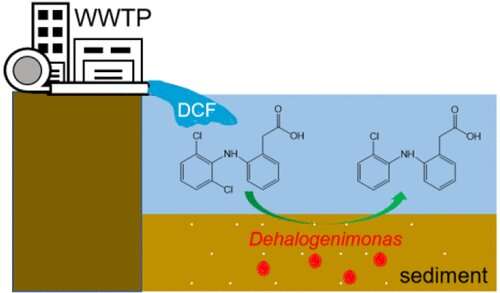New Dehalogenimonas sp. strain is capable of driving dechlorination of diclofenac

Diclofenac (DCF) is a non-steroidal anti-inflammatory drug for human, livestock and poultry. It has become a new pollutant of concern and can be frequently detected in the environment in surface water, groundwater and sediments. So far, however, little is known about the environmental behavior of this new pollutant, especially its microbial degradation and transformation under anaerobic conditions.
Yan Jun and associate researcher Li Xiuying at the Institute of Applied Ecology (IAE) of the Chinese Academy of Sciences (CAS) established an anaerobic microbial enrichment culture using river sediments polluted by diclofenac.
After an incubation of 160 days, the researchers found that in the anaerobic culture system, the microbial community was dominated by a Dehalogenimonas population, and this organohalogen-respiring bacterium accounted for approximately 56% of total microbial abundance. And this Dehalogenimonas sp. was able to obtain energy for growth through dechlorinating diclofenac to monochlorinated products and non-chlorinated aniline phenylacetic acid in the end.
The quantitative real-time polymerase chain reaction analyses confirmed that the Dehalogenimonas sp. is a newly discovered strain capable of driving the dechlorination, so the researchers designated it as Dehalogenimonas sp. strain DCF.
The findings of this study expand the knowledge about the genus Dehalogenimonas, and provide new insights for understanding the environmental behavior, biodegradation and removal of the halogenated pollutants.
This study, titled "Organohalide Respiration with Diclofenac by Dehalogenimonas," is published in Environmental Science & Technology.
More information: Xiuying Li et al, Organohalide Respiration with Diclofenac by Dehalogenimonas, Environmental Science & Technology (2022). DOI: 10.1021/acs.est.1c08824
Journal information: Environmental Science & Technology
Provided by Chinese Academy of Sciences

















